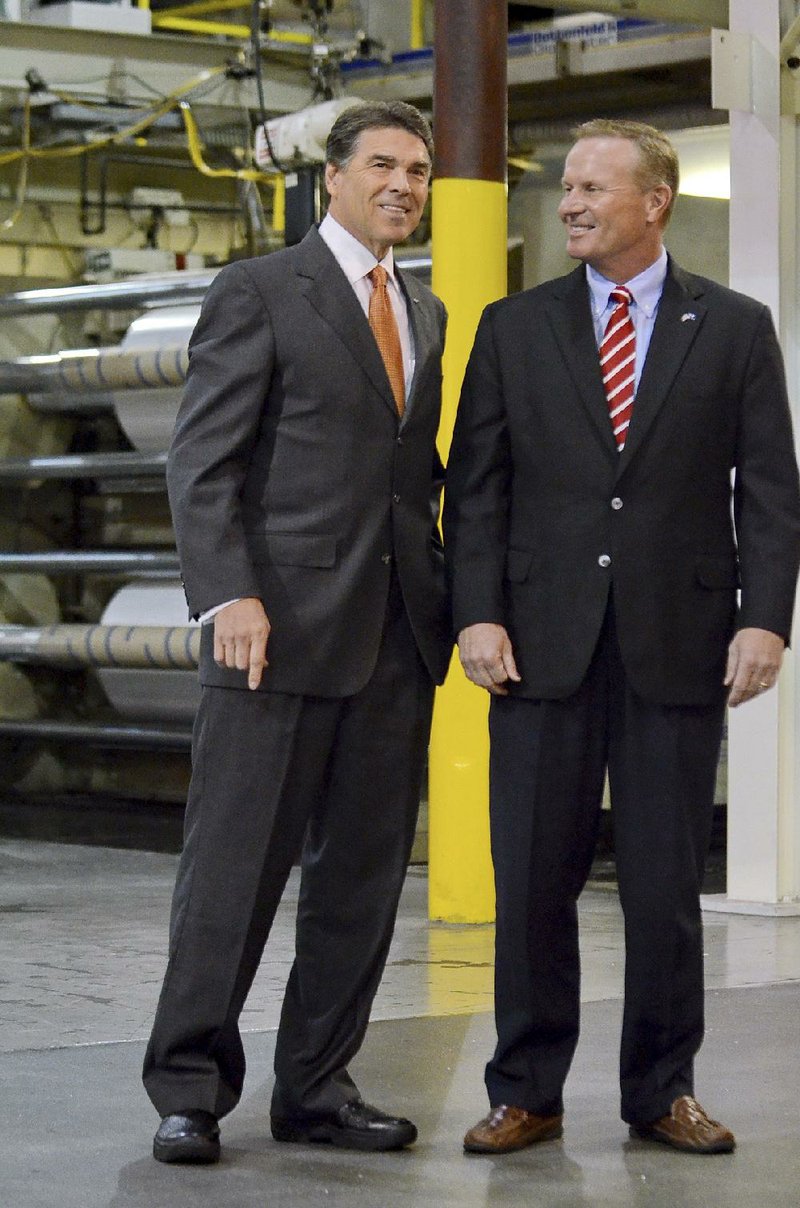GRAY COURT, S.C. — Republican presidential candidate Rick Perry has proposed a tax overhaul that would cut corporate rates and give individuals the option of paying a 20 percent flat tax on income.
“Taxes will be cut across all income groups in America,” Perry said. He displayed an individual income tax form not much larger than a postcard that he said taxpayers could use as he detailed his ideas in a speech Tuesday in South Carolina.
“The net benefit will be more money in Americans’ pockets, with greater investment in the private economy instead of the federal government,” said the Texas governor, who chose the warehouse floor of ISO Poly Films, a plastics company in Gray Court, about 25 miles from Greenville, as his backdrop.
The proposal would lower the corporate tax rate to 20 percent from 35 percent and give multinational companies a temporary incentive to bring home foreign-earned income at a far lower rate of 5.25 percent.
But analysts from the left and right said he would need draconian federal budget cuts to avoid big deficits.
Americans “aren’t searching for a reshuffling of the status quo, which simply empowers the entrenched interests,” Perry said. “This is a change election, and I offer a plan that changes the way that Washington does business.”
Perry’s plan calls for balancing the budget by 2020and capping federal spending at 18 percent of gross domestic product. It includes changes to popular social programs that he said would end the “entitlement culture” in America and do away with what he called the “nanny state.”
Those include raising the age at which future senior citizens become eligible for Social Security and Medicare; limiting future retirement benefits for younger people and letting them invest part of their payroll taxes in private accounts; and requiring wealthier senior citizens to pay more for Medicare services. State and local governments should be able to opt out of Social Security and let workers invest instead in state and local retirement programs, he said.
Perry’s economic plan sets him apart from Mitt Romney, the former Massachusetts governor and second-time presidential candidate who is leading in Republican primary polls. Romney last month released a 59-point, 160-page jobs proposal that keeps the existing tax system while extending income-tax cuts now set to expire and reducing investment taxes and the corporate rate.
Obama’s campaign criticized both men’s plans as extreme ideas that wouldn’t create jobs. Romney’s and Perry’s proposals “would shift a greater share of taxes away from large corporations and the wealthiest onto the backs of the middle class,” said Ben LaBolt, the campaign’s press secretary. “The belief that middle class Americans will benefit if we just give another special break to those at the top was long ago discredited.”
If Americans were allowed to choose between the current system and a 20 percent flat tax, several analysts said, the wealthy would get a big tax cut, and lower-income people would hardly be affected.
The Perry plan “hemorrhages revenue” for the government, said Chuck Marr, an economist at the liberal Center on Budget and Policy Priorities. “It’s a massive tax cut for the richest people in the country,” he said. But it would not demand higher taxes from middle- and low-income people, who would stick with the current tax code because they fare better under its progressive structure.
Those taxpayers would continue to deal with the complex tax code that Perry criticized Tuesday. They would be unable to file their returns on the postcard he waved before cameras to illustrate a flat tax’s simplicity.
A flat tax - even an optional one - by definition would be less progressive than the current system, where the top individual income and corporate tax rates are 35 percent. The highest earners currently pay a higher percentage of taxes while those who earn less owe a lower percentage, with the lowest earners paying no income taxes.
Some analysts, however,said middle-class taxes might be unchanged because the flat tax would be optional.
In the CNBC interview, Perry said he doesn’t believe the country should have a progressive tax system and isn’t worried about being accused of giving big tax breaks to the wealthy.
“When the federal government tries to take too much, they end up hurting the very people they supposedly seek to help: the working class,” Perry said in his speech. “We need tax policy that embraces the world as it is, not as some liberal ideologue wishes it to be.”
Under his plan, individuals could continue under the current system or opt for a 20 percent tax on income.It would preserve popular deductions, including those for mortgage interest and charitable contributions, and exempt $12,500 for each individual and dependent. The plan also would eliminate taxes on Social Security benefits, inheritances, dividends and long-term capital gains.
Information for this article was contributed by Julie Hirschfeld Davis of Bloomberg News and by Kasie Hunt and Charles Babington of The Associated Press.
Front Section, Pages 3 on 10/26/2011
